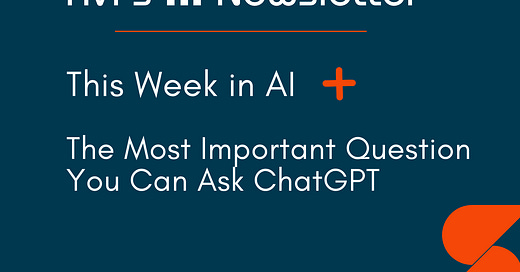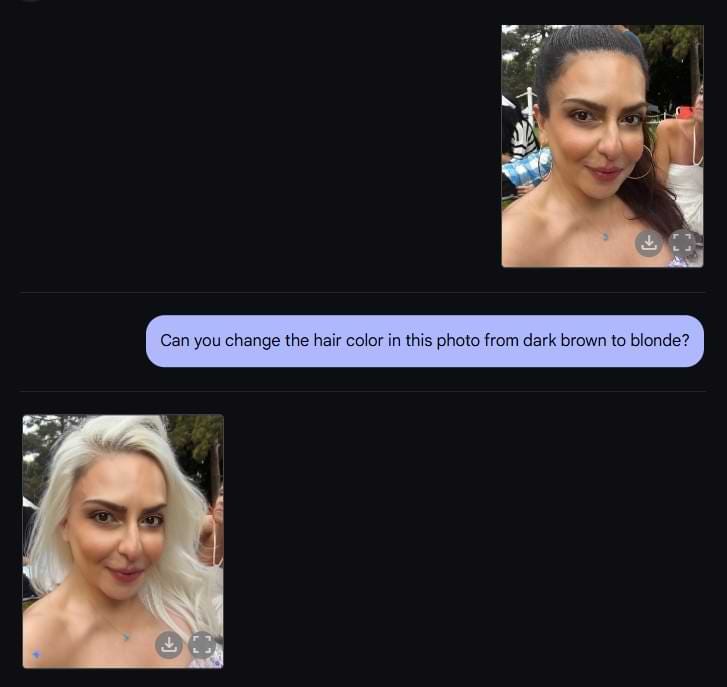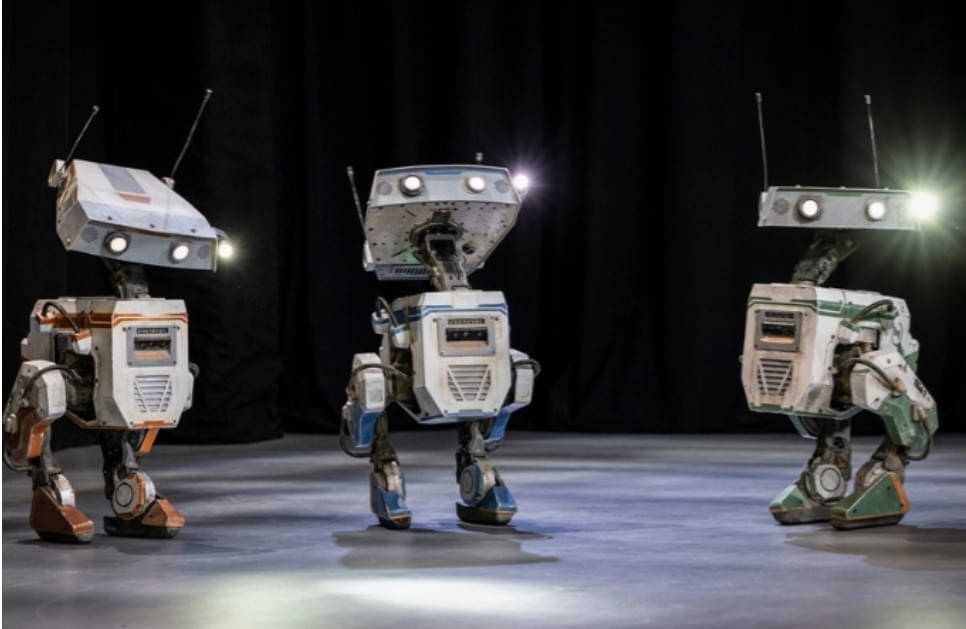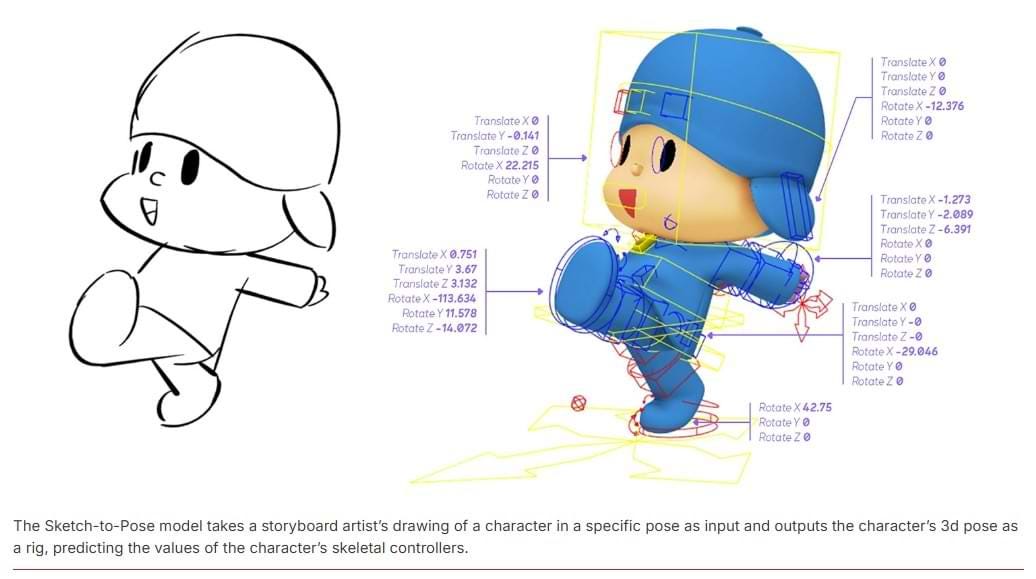AI search is quietly becoming the most powerful gatekeeper of our personal brands and professional reputations.
Before meetings, interviews, pitches, or any significant conversation, people increasingly turn to ChatGPT, Gemini or Perplexity to scope us out.
How confident are you that AI has the right story about you?
There is only one way to find out.
I Asked ChatGPT About Myself—And Found a Problem
Here’s precisely what I asked:
"Do comprehensive research on Avi Hakhamanesh and tell me everything you can find out about her."
ChatGPT got most of it right. It described me as:
A seasoned brand strategist and AI advisor at the intersection of media, technology, and psychology.
Experienced with guiding strategy for global media brands across film, TV, and news—including my stint at NBC News.
An MBA grad from UCLA Anderson School of Management.
Deeply committed to creating sustainable, ethical, and human-centric AI strategies aligned with business goals and brand values.
⚠️ But it missed something critical: my weekly AI newsletter on Substack.
Over the past seven months, this newsletter has become a core part of my personal brand and positioning as a brand strategist with AI expertise.
It captures my nuanced understanding of a highly complex and fast evolving space in ways that a resume or bio never could.
And it’s how I’ve built credibility, trust, and a unique voice in an emerging space packed with noise and hype.
But ChatGPT's responses completely overlooked it
It was a meaningful miss. And a wake-up call.
How I Fixed It (With AI’s Help, of Course)
To diagnose the problem, I went right back to ChatGPT (yes, the irony of asking AI to help fix AI’s oversight about me wasn’t lost on me 😄).
Here’s what I uncovered:
💠Hidden SEO Settings: Turns out Substack has sneaky SEO options buried away, so I never knew they existed. Using ChatGPT (and this clever GPT from the GPT store (meta, right?), I optimized every newsletter’s title and meta description for stronger visibility.
💠Unclear Website Messaging: Despite embedding the latest editions of my newsletter on the home page, I neglected to mention they were hosted on Substack. Fixing this tiny oversight took me all of 90 seconds.
When I checked again a few days later, ChatGPT clearly listed my Substack newsletter in its responses (see 👇.)
When I clicked on the sources (bottom left ☝️), I saw citations from my website, LinkedIn, X/Twitter, Instagram, Threads and even IMDB.
Win. 🏆
I mean, I still have WAY more work to do on AI search, but some of it involves getting more clarity on the work I really want to do.
So, I’ll take this small win for now.
Why This Matters for You (And Everyone Else)
Right now, someone out there—perhaps your next big client, employer, or future partner 😄—is asking an AI search tool about you.
Don't assume ChatGPT or Google will get it right by default. Make sure it does.
Here’s What I Recommend
Test Your AI Visibility. Ask ChatGPT, Perplexity or Google:
"Do comprehensive research and tell me everything you know about [your name]."Spot the Gaps (and cringe, just a little). Note what's missing or incorrect compared to how you want to be positioned
Address the Gaps Strategically.
Refresh Critical Website Content. Update your Home, About, FAQ, and Products and Services pages to reflect who you are and what you offer. Make sure all key information is clear, explicit and complete—easy for both humans and AI to find and understand.
Keep it Current: Routinely update your website and professional profiles to reflect latest projects, achievements and positioning.
Maintain Consistency Across Platforms: Make sure your LinkedIn and other social profiles align on the same messaging. Consistency builds credibility and clarity, especially for AI.
Broaden Your Digital Footprint: Some platforms like Twitter/X block external AI crawlers except for their own integrated ones (e.g., Grok). Diversify your presence so you stay visible on all AI search platforms.
AI search platforms are increasingly our first introduction to the world.
Make sure they're getting your story right.
P.S. AI search is transforming how brands and businesses get discovered, build trust, and engage their audiences. That’s a much bigger conversation, but for now…If you’re a marketer, now’s the time to get AI-native experts in the room to inform your strategies. Things are moving way too fast.
P.P.S. Know someone looking for their next role? Send this their way. AI search is quickly becoming the primary way recruiters evaluate candidates, and those who understand how it works will have a serious edge.
What You Need to Know About AI This Week ⚡
Clickable links appear underlined in emails and in orange in the Substack app.
Google’s new “experimental” AI model can create copyrighted characters and remove watermarks from images, including from those published by Getty Images, Shutterstock and others.
Here’s what I got with just one shot:
And here’s an example of it removing watermarks.
I also tried going blonde while keeping my hair in a ponytail, but that didn’t go so well. 😂😂😂
Last week, OpenAI and Google asked the U.S. government to weaken copyright protections so AI companies could train on copyrighted content without permission.
Now, Hollywood is fighting back.
More than 400 filmmakers, musicians, writers, and actors—including Ben Stiller, Mark Ruffalo, Cate Blanchett, Paul McCartney, and Rian Johnson—just signed an open letter urging the White House to reject Big Tech’s request.
They’re warning that AI companies are “asking to undermine America’s creative industries” by rewriting copyright laws in their favor—despite having billions in revenue to pay for content legally.
Their argument is simple: If AI companies want to use creative work, they should pay for it—just like everyone else.
📚 Meta’s AI book piracy scandal just got worse.
New court documents reveal that Meta not only used millions of pirated books to train its AI but likely distributed them too.
Employees allegedly downloaded books via BitTorrent, a process which automatically shares files with others as you download.
This moves Meta’s legal risk from an AI “fair use” debate—which argues limited use of copyrighted material is legal—to outright copyright infringement, a much harder case to defend in court.
🌐 Claude can finally search the web.
Responses now include inline citations so you can verify sources.
To enable it, go to Settings > Feature Preview > Web Search and toggle it on.
Now rolling out to paid users in the U.S.—access to free users and more countries coming soon.
🎵 Amazon’s AI music play could be a copyright nightmare.
Amazon is integrating Suno, an AI music generator, into Alexa—even though Suno is being sued for training its models on copyrighted songs.
The music industry argues that AI-generated tracks could replace real songs, cutting into artist revenue and undermining the value of human-made music.
This move risks damaging Amazon’s relationships with record labels— who are suing Suno while also currently partnering with Amazon Music.
I was genuinely surprised when this partnership was announced in February, and I still don’t get it. I have no idea what they’re thinking…
🏰 Disney’s Theme Park Robots Are Getting Smarter
Disney is teaming up with Nvidia and Google DeepMind to bring AI-powered robots to life.
The companies are developing Newton, a physics engine that helps robots move naturally and interact with real-world objects. Disney will start rolling out these expressive, interactive robots—including Star Wars-inspired characters—at its parks next year.
China will enforce clear labeling of all AI generated content including text, audio, video, images, and even virtual scenes, starting this September.
📰 An Italian newspaper just published the first-ever issue written entirely by AI.
Every word in Il Foglio’s special edition—from headlines to quotes—was generated by AI. Journalists could only ask chatbots questions and print their responses, word for word.
While the paper frames this as a test of AI’s newsroom potential, it fuels concerns about accuracy, credibility, and job cuts.
Volvo just launched a new ad in Saudi Arabia that was made entirely by AI—and it doesn’t include a single car.
The minute-long video used Midjourney for visuals, Runway editing software for touch-ups, and ChatGPT for narration.
You can check it out 👇.
After more than 20 years, the beloved children’s show Pocoyo is getting a reboot—and AI is playing a major role.
Now owned by French media company Animaj, the show is using an AI-powered Sketch-to-Motion system to speed up animation while keeping artists in control. With Pocoyo’s creator back on board, the series is taking some bold creative risks—Pocoyo will finally speak, and he’s getting a mischievous little sister.
🎮 AI coaching is coming to Xbox.
Microsoft is testing Copilot for Gaming, an AI assistant that analyzes your gameplay, offers live feedback, and suggests strategies to improve your play.
Elon Musk’s AI company, xAI, has acquired Hotshot, a startup working on its own AI-powered video generation models. This likely means the company is gearing up to build its own video tech to compete with the likes of OpenAI’s Sora, Google’s Veo 2 and others.
AI-powered “nurses” are making their way into hospitals, tracking vitals, analyzing patient data, and flagging potential emergencies. Hospitals say AI helps nurses work more efficiently, but nurses argue it’s interfering with their judgment and putting patient care at risk.
Other Interesting Finds 📌
MrBeast’s biggest moneymaker isn’t YouTube anymore—it’s chocolate. His Feastables brand pulled in $250M last year—with $20M in profit—while his videos made the same but lost $80M.
By 2026, content will be just 20% of his total business.
Now, he’s raising more cash to expand into video games, wellness, and beyond—turning his content from a business into a marketing engine.
In case you missed last week’s edition, you can find it 👇:
🤓 This Week in AI
Last week, I promised to spend some serious quality time with GPT-4.5, OpenAI’s newest model and share my thoughts and insights.
That's all for this week.
I’ll see you next Friday. Thoughts, feedback and questions are always welcome and much appreciated. Shoot me a note at avi@joinsavvyavi.com.
Stay curious,
Avi
💙💙💙 P.S. A huge thank you to my paid subscribers and those of you who share this newsletter with curious friends and coworkers. It takes me about 25+ hours each week to research, curate, simplify the complex, and write this newsletter. So, your support means the world to me, as it helps me make this process sustainable (almost 😄).














